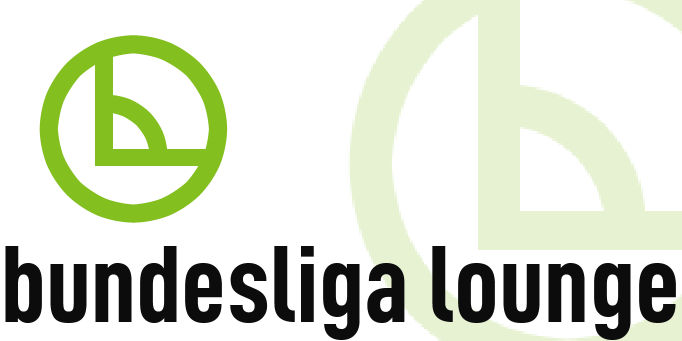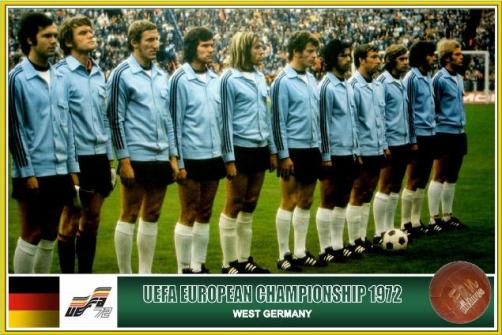The Greatest? Euro 1972

In the first of a three-part series looking at German triumphs in the European Championships ahead of this summer’s tournament, Kyle Barber harks back to one of the most impressive national line-ups in history.

Maier, Breitner, Beckenbauer, Netzer and the eponymous Gerd Müller: some of the most lauded and recognisable names of German footballing history, and all synonymous with success. Having forged such reputations over the five or so years which preceded the 1972 European Championships, returning from Belgium with the trophy aloft both cemented their collective place in the annuls, and paved the way for the future.
Played out over an 18-month group league phase, followed by two-legged quarter finals and then the semi-finals and final, the format of Euro ’72 was somewhat different to the two-week setup of this year’s extrav. Of course at that time,Germany was still very much a divided nation. And while West Germany enjoyed a fairly routine passage through the league stage – topping their group with an unbeaten record (four wins and two draws, from games with Poland,Turkey and Albania) – their neighbours fared less well. Drawn with the imposing Yugoslavs and free-scoring Dutch (and whipping-boys,Luxembourg),East Germany were always likely to face a tough task to secure qualification (with only one team from each group progressing to the last eight). Thus it proved, as an opening run of three wins was overshadowed by two losses and a draw, leaving the side in third spot, two points behind group winners Yugoslavia.
Group 8
| Team | P | W | D | L | GF | GA | Pts |
| West Germany | 6 | 4 | 2 | 0 | 10 | 2 | 10 |
| Poland | 6 | 2 | 2 | 2 | 10 | 6 | 6 |
| Turkey | 6 | 2 | 1 | 3 | 5 | 13 | 5 |
| Albania | 6 | 1 | 1 | 4 | 5 | 9 | 3 |
Group 7
| Team | P | W | D | L | GF | GA | Pts |
| Yugoslavia | 6 | 3 | 3 | 0 | 7 | 2 | 9 |
| Netherlands | 6 | 3 | 1 | 2 | 18 | 6 | 7 |
| East Germany | 6 | 3 | 1 | 2 | 11 | 6 | 7 |
| Luxembourg | 6 | 0 | 1 | 5 | 1 | 23 | 1 |
The quarter-final line-up shaped up with Italy playing off with Belgium, Hungary taking on Romania, Yugoslavia facing the USSR, and West Germany drawn against England. It is generally regarded that a good deal of the self-belief engendered in the West German side of the 1970s had been generated a little over four years before the 1972 Final; through a 1-0 friendly win over World Champions England in Hanover. Harking back to his solitary strike that decided the game, Franz Beckenbauer would later proclaim: “It was the first time in history we had beaten the English. That was when we realised we could, and [we] lost some of the respect we had [for them]”. Cast forward to 1970, and that confidence was reinforced as the two squared off in the World Cup quarter-final; this time with the Germans coming from two goals to take the victory 3-2. Now they would do battle once more, this time over the course of two legs.
The first leg saw the two teams returning to the hallowed Wembley turf. On a floodlit, damp late-April evening, the away side confirmed that the tide had fundamentally turned in their favour, producing a stirring, fluid display to comprehensively wash their hosts aside. In front of a crowd of 96,800, the West Germans took the lead through Uli Hoene? after 26 minutes, yet failed to reinforce their dominance, and England’s equaliser came courtesy of Franny Lee’s 77th minute tap-in. Eight minutes later, Bobby Moore mistimed a challenge on Siegfried Held, bringing the wideman crashing to the floor. Up stepped Günter Netze to drive the resulting penalty just beyond Gordan Banks, before ‘Der Bomber’ all but finished the tie three minutes later, beating six England defenders in the process. The post-match clamour that followed the away side’s performance was typified by L’Equipe’s proclamation of “football from the year 2000”, lending it an extra, ethereal quality. The second leg was something of a non-entity in all honesty, as the two teams played out a lacklustre goalless draw in Berlin’s Olympiastadion. Nonetheless,West Germany’s stock was rising, and their status on the global stage had been noted.
Quarter-Final, First Leg
| 29/04/1972 Wembley 96,800 | England Lee 77’ | 1-3 (0-1) | West Germany Hoene? 26’ Netzer 85’(p) Müller 88’ |
Quarter-Final, Second Leg
| 13/05/1972 Olympiastadion 76,122 | West Germany | 0-0 (0-0) | England |
But it could just as easily never have come to pass. In ‘Tor’, Uli Hesse notes how team coach, Helmut Schön, felt he was looking at “a dressing room of doubting men” before the double-header with the 1966 World Champions, recalling how injuries to the likes of Weber, Vogts and Overath left a depleted squad, adding to the malaise felt by the Bayern Munich contingent; who had suffered debilitating defeats to Rangers (in the Cup Winners Cup) and Duisburg (in the Bundesliga). With the 20-20 vision of history, that all merely serves to enhance the legend subsequently enjoyed by the early-1970s side.
And so to the ‘final’ tournament, and the semi-final match against the hosts Belgium(with the winners to meet either Hungaryor the USSR). Despite making notably heavy work of the home side, the dominance of the West Germans has since been acknowledged and well-credited by both sides. With Beckenbauer employed in his newly-ported deep-lying midfield playmaker role, the Belgians struggled to adapt their 4-4-2 sufficiently to shut down the space afforded to Der Kaiser, who was thus left to dictate the pace of the game. As a result, they frequently found themselves pulled out of position, allowing Jupp Heynckes and Erwin Kremer significant freedom on the flanks, and Netzer likewise in support of Müller. It was this pairing that would combine for the opening strike of the game, the latter heading home an inventive lob from the former with 24 minutes on the clock. It was at nigh-on the same juncture in the second half that the lead was doubled; the same duo coming together for Müller to steer home from close range on 71 minutes. And although Belgium had their chances – eventually pulling one back through an 83rd minute strike from Odilion Polleunis – the visitors’ ascendency was never really challenged.

Semi-Final
| 14/06/1972Antwerp55,669 | Belgium Polleunis 83’ | 1-2 (0-1) | West GermanyMüller 24’, 71’ |
Just four days later, and the apparent failure to get into their stride in the semi-final showed no sign of being revisited as the West Germans lined-up against a USSR side that was itself a scant memory of the 1960s behemoth. The match bore all the hallmarks of the old adage of ‘the King is dead; long live the King’, as the West Germans veritably tore into their opponents. Bouyed by a new-found level of belief, the West Germans prowled the surface of the Heysel Stadium as if it were their own, and the opening goal never seemed too far away, eventually arriving through the reliable instep of Müller after 27 minutes. Half-time recorded West Germany as having enjoyed over 60% of the ball, and an equal territorial advantage. Within 15 minutes of the restart, it was all over; Herbert Wimmer netting the second on 52 minutes, and Müller rounding things off just six minutes later, to register the largest ever winning margin in a European Championship final. The harmony of the performance was summed up by Müller as the final whistle blew: “we understand one another on and off the pitch, and you can’t ask for any more than that. Everything worked”.
Final
| 18/06/1972Heysel Stadium43,437 | West Germany Müller 27’, 58’ Wimmer 52’ | 3-0 (1-0) | USSR |
The West Germans took six places in the overall Team of the Tournament, Beckenbauer, Breitner, Hoene?, Netzer, Heynckes and Müller lining up alongside four Soviets, and one Belgian.
Gerd Müller took the Golden Boot with 11 goals across all stages (five in the post-Group phase), to go with his Europe-wide equivalent. Beckenbauer secured the European Footballer of the Year title, and the quintessential West German ascendancy and efficiency was spawned; thus to dominate the next decade.



 Apple podcasts
Apple podcasts Google podcasts
Google podcasts Spotify
Spotify TuneIn
TuneIn RSS feed
RSS feed Instagram
Instagram Blue Sky
Blue Sky